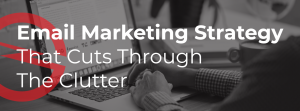Reach your audience with email marketing! Learn how Today!
One of the most persistent challenges marketers face every day is breaking through the clutter that pervades the digital landscape. Practically every brand with a digital presence uses e-blasts and email campaigns in their marketing strategy.
Altogether, it causes a whole lot of clutter that needs cutting through.
Shift Your Perceptions
In forming an impactful email strategy, it’s good to understand the difference between e-blasts and targeted emails. While mass emails certainly cast a wide net, they fall short of making a valuable connection with your subscribers. If you have a very specific, large target audience who responds to a particular message, broad e-blasts can be effective. Generally speaking, however, your target audience has subsegments who respond to your message differently. They have different needs, different ideals, and prefer different means of communication.
Think of e-blasts as shouting your message to a large crowd and targeted emails as holding a smaller seminar with interested parties. Each has its place in email marketing strategies.
Rather than shouting your message through e-blasts, focus on engaging your targeted subsegments with content that is valuable to them. Speak to them as if you’re trying to solve their problems instead of selling them a benefit – a methodology that should be used throughout all of your marketing strategies.

Start Email Marketing Today
Call 816-931-0050
Segment Your Subscribers
Once the difference between e-blasts and targeted emails is clear, you can focus efforts on segmenting your audience and delivering targeted messages to them. Segmenting is filtering your email subscribers into groups based on common factors. There are a number of ways to segment your audience based on factors, such as location, interests, education, and experience. The purpose of segmenting is to deliver content that is directly relevant to an individual, creating a personal interest, and driving qualified leads.
As far as content is concerned, the more personalized the better. Call out specific things you know about your subscriber to peak their interest. This is especially important in subject lines and call-to-actions (CTAs).
Above all, delivering detailed messages to specific segments allows you to create actionable content. Actionable content is content that your subscriber can see immediate value in and want to know more about, drastically increasing their inclination to engage your CTA.
Automation is Your Friend
Engaging your subscribers doesn’t end after your first email is sent. Follow-up emails should be an important part of your strategy, along with “welcome” emails and even additional offerings. It’s all about forming a valuable relationship with the subscriber. This can take a lot of coordinating, but thankfully email automation makes it easier. Through email services, such as HubSpot and MailChimp, you can schedule email sends or create workflows that automatically send follow-up, thank you, additional offerings, and welcome emails. As long as your content is solid, you can set it and forget it (kind of).
Another method similar to HubSpot’s workflows is creating drip email campaigns in which only subscribers that have performed an action receive additional emails or offerings. These campaigns literally “drip” information to your engaged subscribers. Drip campaigns are an excellent way to weed out uninterested subscribers and focus on qualified leads.
Strategy is Your Best Friend
While we’ve been discussing the specifics of email marketing, it’s worthwhile to take a birds-eye-view of the topic. Your email campaign strategy should start with goal setting. Identify what problems you aim to solve for the consumer New subscribers? Remarketing to previous customers? Promoting a special sale? Outline your goals and expand from there.
Then, determine what campaign methods or tactics you plan to use to achieve your goals. Drip, blasts, etc. In each subject line, graphic, and email body you must ensure your campaign aligns with your brand. In look, messaging, voice – everything.
A tool to help provide clarity to your strategy is mind-mapping. Mind-maps are a type of flow chart clearly defining your email strategy from the first send to conversion.
Collect and Analyze
No email strategy is complete without analytics and key performance indicators (KPI) in place. Open rate, click-through-rate (CTR), responses, and unsubscribes are your main key performance indicators. Keep detailed records of these metrics, so you can compare different email performance. For instance, different subject lines can affect your open rate, so you should constantly compare and contrast every aspect of various emails. This is where A/B testing comes in handy. A/B testing allows you to better figure out what is working and what isn’t with different pieces of your email.
Cultivate Relationship, See Success
Intention is important in email marketing. As long as your focus is on building relationships that add real, actionable value to your customers, your email strategy is off to a great start. As your strategy comes together, do your best to implement targeted segments, a solid automation plan, and informative KPIs – all wrapped up in a clear, consistent mind-map.
Take a look at one of Gragg’s own branded emails that was a part of a larger campaign to entice our subscribers into engaging with us. Our headline is interesting, our message is succinct, and our content delivers immediate value to the subscriber in a visually interesting way.
More email marketing
We continually improve the performance of your campaign while saving you time. We use multivariate testing on subject line and on the time of day when messages are sent to determine impact.
We are mobile-friendly. Mobile opens accounted for 43% of all email opens in a recent study by Campaign Monitor, and trends point to even more people using their phones as their primary email platform in the future.
CAN-SPAM compliant. We create campaigns that stay compliant and stay out of spam folders.
We build trust through communication and tangible results. We work closely with our clients to develop a true partnership.
Ready to engage your audience with email? Contact us today!